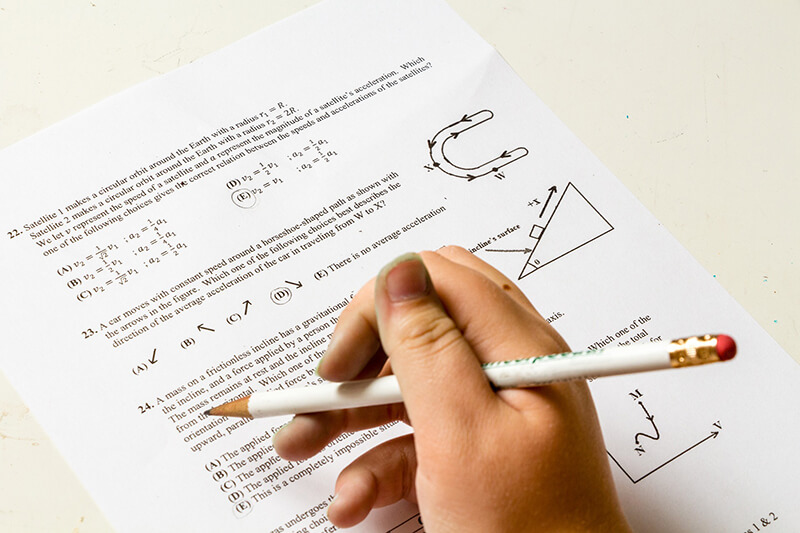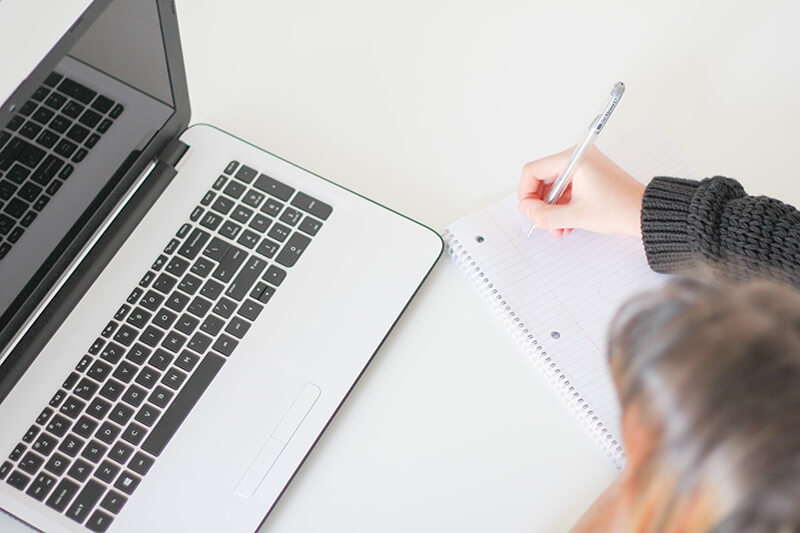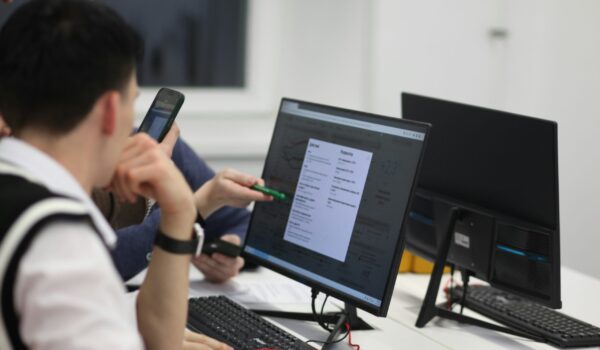
How to Study Effectively: Expert Advice to Help You Ace Any Exam or Test
 Learning how to study effectively can feel like some kind of an acquired skill. There’s nothing worse than sitting in front of your study notes, trying to figure out how this will possibly fit in your brain, and losing all motivation to even begin in the first place.
Learning how to study effectively can feel like some kind of an acquired skill. There’s nothing worse than sitting in front of your study notes, trying to figure out how this will possibly fit in your brain, and losing all motivation to even begin in the first place.
When it comes time for exam preparation, or for that end-of-term test, give yourself the best fighting chance at getting great grades and acing your class. That begins with the right study skills and habits. Luckily, we’ve got a lot of experts on our team who have the best study tips and advice, and we’re going to walk you through every step to show you how to study better, smarter, and more effectively. With our help, you’ll walk into that exam room like you own the place.
Don’t worry. It may seem like a lot. But with the right learning and preparation, you can handle even the most unexpected questions.
Ready to learn the secrets of how to study effectively and ace your next test or exam? Let’s get started.

Get Your Head in the Study Zone
First and foremost, you need to be mentally prepared. You can’t be constantly thinking about what happened on last night’s episode of Riverdale while trying to pack your brain with your history notes. That just doesn’t work. Forget about Archie and Jughead for a little while. They’ll be there when you’re done studying.
Start each study session by setting goals. What do you hope to accomplish? Do you need to study for one cumulative exam, or are you trying to nail down particular subjects at a time? This will help you figure out how you’re going to use your study time and stay on track to complete your list. It’s also a good way to determine which of your study goals are your priorities, and which things to focus on first.
Next, it’s time to get focused. Most importantly, find your motivation. Your goals should be the first step. The next is preparing to dive in.
https://www.instagram.com/p/B0W5sCOl2em/
Getting Motivated: How to Study Effectively When You Really Don’t Want to
Sometimes it’s hard to get motivated to study. Realistically, no one actually likes to study. In fact, study time is about as appealing as getting food poisoning. But we all have to do it, and it’s just a part of the learning process.
That being said, we’re all motivated by something. Getting good grades is usually the key motivator when it comes to honing in on your study skills. That’s a good enough reason for most of us to roll out of bed and open up the books.
To help yourself stay on track, develop good study habits. Some of our most effective expert tips include getting enough sleep and keeping your phone on airplane mode during every study session. When you’re not really motivated to study, your phone is a major distraction. It’s easy to just check that one thing one more time before you start. No matter what you think, it won’t just be one thing to check. You’ll end up down a YouTube rabbit hole like the best of us. Just turn it off.
Another great way to develop good study habits is to take breaks. Stop and treat yourself at appropriate times, such as between subjects or when you’ve completed an assignment. Giving yourself a reward every so often can help keep you focused on your study material. However, make sure this isn’t always a sugary or fatty treat. A few candies here and there are fine, but too much sugar or fat and you’ll interrupt your brain’s learning process. If snacking on carrots and hummus while studying doesn’t really appeal to you, try giving yourself a reward that isn’t food related, like 15 minutes to play Candy Crush or sending a few Snapchats to your friends (but turn your phone back off when time is up).

Find The Right Study Setting
One of the most important steps in learning how to study effectively is finding a study spot where you can focus and avoid distractions. Just like a good movie, setting is key. According to ThoughtCo, the top nine places to study include the library, bookstores, coffee shops, parks, empty classrooms, your bedroom, and community centers.
Your study spot has to be something that works for you. Just because your friend likes to go to the library to study doesn’t mean that will work for you, too. Consider where you’re going to be the least distracted, and where you feel the most at ease. Maybe this is your bedroom, or maybe it’s a cozy spot in the student center. Part of learning to study smart is learning where you are the most focused.
If you’re a people watcher, don’t study in public spaces. There is just way too much going on to really get into your work. The same thing goes if you’re a big snacker. Studying at a coffee shop can be a great, peaceful way to get work done, but if you’re just going to keep getting up to buy cookies and chugging caffeine the whole time, maybe it isn’t the best study spot. Likewise, if you have noisy roommates or your friends are constantly popping by, your bedroom might not work, either.
Wherever your study spot is, comfort is key. If you’re not comfortable, you’re just going to start shifting around and getting distracted trying to find a better position. Once you’ve found that study spot, it’s time to get organized and form some great study habits.

Organize Your Study Space
Once you have your setting in mind, it’s time to get organized. Staying organized is incredibly beneficial for your mind and, more importantly, your productivity. Your workspace is ultimately a reflection of your study habits. The more organized your space is, the less distractions there are, which means more study time and less of that other stuff. You know, the stuff you do to kill time and procrastinate.
The first thing you need is enough space on your desk to lay out your textbooks, assignment materials, and anything else that might be relevant. If you don’t have space, you’re going to end up spending more time figuring out where things will stay than actually studying.
Make sure you have all of your materials on hand as well. If you start looking for things as you go, you’ll increase your chances of being distracted, which makes it harder to get back on track when you go back to your study notes. To prepare for your study session, gather all of the materials you think you’ll need ahead of time, and put it all together in a container. This way, you can reach for things as you need them without digging around.
https://www.instagram.com/p/Bx7oRMNlqeW/
Time Management: The Downfall of Many College Students
Okay, so you’ve organized your desk or work space and you’re ready for the next step in learning how to study effectively. That would be time management. Even just hearing those words is enough to make people shudder, but the truth is this is a necessary study skill that you will use for the rest of your life. You may as well nail it down now, while you’re learning in school.
Use a Physical Calendar or Wall Planner For Your Study Schedule
You may think it’s easier to keep track of everything on your phone or iCal, but having everything laid out in a physical calendar you can hang on your wall can help you visualize and plan. It’s really easy to miss tasks and reminders when you’re relying only on your phone. A wall or desk planner is a useful tool for creating a study schedule that gives you enough time for breaks and a social life in between. This tells you exactly when your study time is, and helps you plan out everything you need to do.
Guess what? Those rewards that we were talking about before can be added to your study schedule too, so you have a goal you know you’re working towards. But don’t let your rewards take over the rest of your planning.
Tips and Tricks to Help With Time Management
Here are some helpful time management tips and tricks that you may want to use:
● Don’t try to multitask. This negatively affects your ability to focus on the task at hand.
● Avoid leaving everything to the last minute.
● Set study time limits for each task and use a timer to stay on track.
● Get enough sleep. Your body needs a good amount of sleep to be able to concentrate and work to its fullest potential.
● Relax! That’s what breaks are for.
● Don’t overcommit yourself and let your study schedule suffer. If you don’t have time for something, you don’t have time for it. Just say no.
● Make a checklist. This tells you what you still have left to do, and you’ll feel a sense of accomplishment and pride when you check things off.
Study Smart: Lay it All Out
Lay out each individual task for each exam or assignment. Don’t just write “study for history paper.” Write down each book you need to read, which notes you have to go over, and when the due dates are. Try to estimate how much time it takes to do each thing so you can effectively include it in your study schedule. If you have certain exams or class subjects that you know will need more study time than others, this is how you can determine where to prioritize.
When you visualize how much work you actually have to do, this can help with time management. It’s one thing to know which tests you have and when your exams are, but it’s another thing to actually see it and realize how much study time you’ll need to set aside for each test.
An important thing to note is don’t leave your biggest goal for the last thing in your study schedule or your checklist. You may want to put a bunch of little things first so you have more to check off and can feel more accomplished, but if you leave those big things until the end you’re more likely to feel overwhelmed than anything.

Mnemonic Devices
Mnemonic Devices are a common way for people to study material and remember information. They can come in a variety of forms, such as acronyms, rhymes, and songs. In fact, you’ve probably used them at least once before. Have you ever stopped to use Roy G. Biv to list out the colors of the rainbow? That is a mnemonic device. What about SOHCAHTOA from high school math class? That’s another common one.
Make up your own mnemonic device to help you remember important concepts or the order of things that you know are going to be on your exam. Poems and songs are most effective because they trigger the acoustic encoding in our brains and last longer in our memories. That’s why you’ve always got a song stuck in your head. Let’s try and get the right song stuck in there.
https://www.instagram.com/p/BzecGiwj8re/
Using Study Groups
Another way to learn how to study effectively is to use study groups, but only if they work for you. Study groups aren’t the right fit for everyone. If you’re an easily distracted social butterfly and would be tempted to chat, you could end up breaking everyone else’s study habits, too. Some people prefer to study alone, and if that is what makes you study more effectively, then you should stick to that.
The Advantages of Studying Together
One of the best aspects of a study group is having other people there who are in the same situation as you. Not only do those other people help you stay in the study zone, but you can also use them as tools. Other people can help you stay focused because you’re all accountable together. They can also help you with your study notes and fill in any gaps you may have missed from class.
Try quizzing each other. Quizzing one another and taking practice tests are great ways to really tell if you’ve learned the material or are ready to actually take the exam. You could have a family member or friend quiz you, but it’s easier when it comes from someone in your actual class who is also trying to learn the material.
How to Find A Study Group
Creating or joining a study group isn’t hard when you approach it the right way. Ask the people in your class if they’d like to study with you. This could be a brief chit chat as everyone is packing up to leave, or settling in before the professor arrives. You could also start a Facebook group and find people in your class who you may not speak to otherwise, and then use Facebook to coordinate meeting times. Check out our blog on how to organize a study group for more tips and pointers.
If you want to know if there are already study groups that you can join, just ask around. Talk to someone at your student center. Sometimes they have resources you can use to make connections and join in on group study sessions. Ask classmates what they do to study and see if they already have a group they’d be willing to let you join. Speak up and you will find it.

What the Science Says
There are some scientific methods to studying that have been shown through academic research to help you learn how to study effectively and improve test scores. Here are some of the most effective and well known methods that you can try.
The Feynman Notebook Method
If you’ve ever watched the Big Bang Theory, you know who Richard Feynman is. He is a physics god – one of the most important physicists in history and a Nobel Prize winner. Well, Feynman developed a technique for learning difficult or confusing concepts that can help your study skills.
The Feynman Technique, also known as the Feynman Notebook Method, begins with a blank notebook. On the title page, he would write, “Notebook of Things I Don’t Know About.” Then, at the top of each page, he would write a topic he wasn’t familiar with. Next, he’d write everything he knew about that topic, and then would continue to add to the page in his own words when he learned more about it. The point of this is to explain complex material in ways that make sense to you. Then, you can go back during your study session and review the areas where you know you’re having trouble.
The Pomodoro Technique
The Pomodoro Technique, developed by Francesco Cirillo, is a time management method where you use a timer to break down study sessions into intervals. Each interval is called a pomodoro, and there is a small break between each one. Think of it like reps of weights at the gym. Four pomodoros generally make up one study session for one specific task. You can take a bigger break after four pomodoros if you’re ready to move on to the next task.
At Homework Help Global, we strive to provide as much help as we can to students who need it most. To learn more about the Pomodoro Technique, check out episode 13 of The Homework Help Show. In this episode, our host, Cath Anne, digs into developing good study habits using this method for productivity.
The Leitner System
Named after Sebastian Leitner, who developed the system, The Leitner System is essentially the use of flashcards for studying. This is a good technique to help your study skills because it boosts memorization and cognitive function. Many of us are familiar with using flashcards, but with the Leitner System, the goal is to keep the flashcards simple and straightforward so it’s easy to focus on certain concepts.
Active Recall
Active Recall is simple, but effective. It’s all about stimulating your brain while you’re reading or studying the material to promote long-term memory. After every section or chapter you read, close your book and review what you just read. Repeat to yourself some of the important information you just read. This way, instead of just reading something and forgetting it, you’re now actively learning it and will actually know it when it comes time to take your exam.
Not really sure what this means? That’s what we’re here for. To learn more about Active Recall, watch episode 40 of the Homework Help Show where, Cath Anne puts it in context and tells you how to incorporate it with your study habits.

Acing Exam Preparation
Okay, so you’ve gotten the gist of how to study effectively and now the big day is right around the corner. When it comes time to get ready for your exam, you might want to consider some extra preparation tips to be as prepared as possible.
● Plan out exam day. The last thing you want to do is be rushing around and building up your anxiety about getting there on time.
● Bring water with you and stay hydrated.
● Don’t wake up and roll out of bed for a morning exam. Wake up early to give your brain time to kick into high gear.
● Collect all of the materials you need, such as pens or pencils, and bring extras just incase.
● Eat a healthy breakfast.
● Don’t forget your student card and ID.
● Slow down and breathe. You’ve got this!
https://www.instagram.com/p/Byk1gSvAlT_/
Cramming and Last-Minute Studying Don’t Work
You shouldn’t leave everything to the last minute, but sometimes things come up and it happens. In fact, some people do believe that they study better when they cram. If you’re starting to run out of study time, you may feel like you need to have some tricks up your sleeve in preparation, but it’s not going to work the way you want it to.
Learning how to study effectively in crunch time is nearly impossible. You need to give your brain time to process the information. If you run out of study time and are in a rush to get everything crammed in, often you’ll end up focusing on how you’re running out of time and forgetting what you crammed. In fact, cramming in a study session can actually cause more harm than good. Use your study schedule and plan out your time management and you won’t have to cram in the first place.

Helpful (And Free) Study Apps
Where would we be without smartphone apps? Since you can find an app for almost anything, it’s no surprise there are plenty of apps for Android and iPhone that can help you learn how to study better and improve your study habits. Here are some of the top rated apps.
Evernote: This is a helpful app for taking notes, as it lets you add your own attachments, audio clips, and even checklists to your class notes. The free version lets you connect two different devices, so you can take notes on your laptop in class and then see them later on your phone.
Quizlet For Mobile: The goal of Quizlet is to help you study smart. With the free version, you can create interactive quizzes and flashcards that can help you with learning new subjects or nailing down your material.
MyStudyLife: Essentially, this is a calendar app designed specifically for students to help you keep track of assignments, due dates, classes, and other projects. It can work in conjunction with your wall planner so you can check your schedule while you’re on the go.
SimpleMind: A good study tip is to create a mind map to go over what you already know and what topics you need to spend more time on. The SimpleMind app helps you create those mind maps and see them in a nice, visually appealing way.
If you want to learn about more apps that can help make your overall life easier as a college student outside of learning how to study effectively, check out our favorite apps for college students. There’s always an app for everyone.

Exercising and Your Brain
Boost your brainpower and prep for studying by exercising beforehand. Getting some exercise pumps more oxygen to your brain, which can in turn stimulate it and help it function. This can also help your brain release more hormones, which stimulate cell growth. When it comes to learning new things or remembering study topics, that’s your goal.
Just don’t try to memorize your material while you’re working out. Many students try to cram in a study session at the gym by bringing their notes and reading them while on the treadmill or elliptical. Give yourself a break and allow your mind to focus on one thing at a time, and sweat it out. Hit the books when you’re done.
As a bonus, exercising and your mental health are directly connected. Exercise is shown to be capable of helping cope with the symptoms of depression and anxiety, among other conditions. So when it gets close to exam time and you’re feeling anxious or stressed, hit the treadmill for a little bit.
https://www.instagram.com/p/Btm68cfFqsN/
Stress Relief in and Out of Your Study Sessions
Exam preparation and tough study sessions can be stressful. The problem with stress is that it can have negative effects on the brain and can actually impact your study success. It’s okay to feel stressed to some degree, because that’s a part of life, especially during exam time. However, when you are experiencing significantly higher levels of stress, this can be harmful to your physical and mental health. You can lose your ability to concentrate, become depressed, and even suffer headaches or stomach pains.
Try diffusing some essential oils or lighting incense (carefully) during your study session. Of course, you won’t be able to do this if you’re studying in a common space. But this can help you concentrate and de-stress. Taking regular breaks is also a good way to relieve stress.
It’s important to make sure you are de-stressing in other ways, not just during study time. In fact, studying can also lead to unwanted stress for many students. Check out some of these easy ways to de-stress in college for some helpful ideas to try.

A Few Final Study Tips Before You Get Started
Here are some final study tips that can be helpful to remember as you try to make the most out of your study time.
● Stay hydrated while you’re studying.
● Eat brain food – foods that are high in protein, vitamins, and other nutrients help increase concentration and memory.
● Read about our favorite secrets for acing multiple choice tests.
● Don’t listen to music during your study session. Studies have shown that listening to music while studying can lead to poor performance. If you must have music, choose classical songs without any lyrics.
● Switch up your study space if you start to get bored.

Figured Out How to Study Effectively, But Still Need Some Extra Assignment Help? We’re Here For You
Sometimes all of your assignments, homework, and study sessions can pile up and become too overwhelming. That’s okay – we all need a little help sometimes. That’s what Homework Help Global is here for. We’re here to help you learn how to study effectively in any way we can. But when you’re out of ideas and motivation, that’s our time to shine.
Homework Help Global is a network of highly educated, experienced academic writers who are on hand to help you with your schoolwork. Whatever the subject is, we have someone on our team ready to provide you with a custom paper, free from plagiarism and formatted to your specific requirements or guidelines. Order custom written essays and assignments, book reports, and even online exams.
Whether you’re too busy with study sessions to write your assignments, or you have so much on your plate you haven’t even thought about studying yet, get in touch with us for a quote and to order now. We will help you make your life a lot easier and less stressful.
Share:

